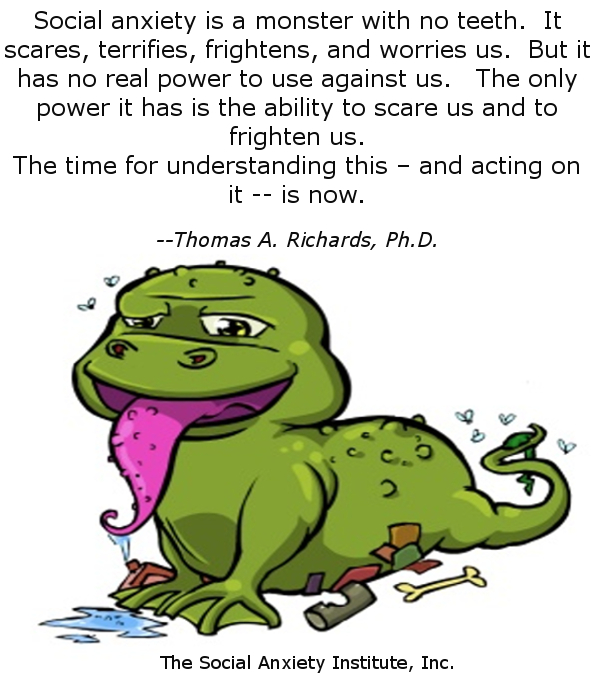
For people with social anxiety, the disorder is seen as a horrifying, scary, terrible monster. It CAN be this way for people who get no help or treatment. With treatment, however, this monster really has no “teeth” and no real power to control you unless you fuel it and give it power.
One of the very first things we learn in therapy is that you have some control -- even at first -- over your anxiety. We use specific methods and solutions to make you aware that you have this control. We start with our slowing down strategies (there is more than one) because at the heart of anxiety, physically, is an excess of adrenaline and cortisol in the body.
The only way to decrease the excess adrenaline and cortisol is by putting into place a slowing down/calming strategy that works for you. This takes practice, but you get better at it as the days go by. Maybe more importantly -- you begin to realize you have the ultimate control over anxiety -- it doesn't seem like it at first, but that's why we immediately start with THERAPY so that the monster can’t keep bothering us forever. The anxiety monster doesn’t have long to live as you become aware, and put into place, the methods and strategies that will change your brain – your thoughts, your beliefs, and your feelings.
It is very true that anxiety appears like a terrible monster, but keep in mind it really doesn't have any way to hurt you, unless you continue to give it power. Anxiety likes it when it can terrify and scare you. In group therapy we learn that the anxiety monster CAN be controlled. You can take its power away by slowing your body down (this is something you have to learn) and you prove to yourself that the anxiety monster has no teeth. It may be easier to overcome social anxiety than you think right now.
Our current THERAPY group is in its fifth week -- and there is very little anxiety about making introductions and mingling (making small talk) anymore. The group members have learned the methods and strategies and we have been gently working on these things every Saturday in our therapy group. We also work on these therapy methods in our evening group activities. You can work on using the methods and strategies you learn outside the group therapy room. It is best to start as you are hanging out or socializing with other group members – people that are learning to get better, too.
Right now, in the fifth week of group therapy, ALL of the group members feel comfortable enough to stand up in front of the room and answer questions, read something, or speak spontaneously about something that occurred in their life.
To be perfectly honest, in all the groups I've run since 1994, I've never had a group member not be able to stand up in front of a group – it’s always their choice because they volunteer to do this -- and feel relatively comfortable, not anxious, as they do it. This happens in the third to fifth week of group therapy.
I should always emphasize to you that in group therapy, run by an experienced psychologist or therapist, the progress you make is usually much faster than you think. You do not have to believe me. Just keep your mind open to the idea that MAYBE the group therapy will work. As long as you keep an open mind and DO the therapy... you will certainly be able to FEEL the difference in anxiety after the first month. Each month, when you look back at what you've done, you will be able to see and feel the difference.
If you have a normal case of social anxiety, you can always overcome it if you have the will to. I see it happening on a weekly basis... there are great amounts of progress in the people I’m working with. It happened to me, too, so I have a wealth of social anxiety experience to draw from.
Please make the choice to overcome social anxiety -- see the anxiety monster without any teeth... a monster that has no real power over you… a monster that you will gently "love" to death and it will no longer have any power over you.
